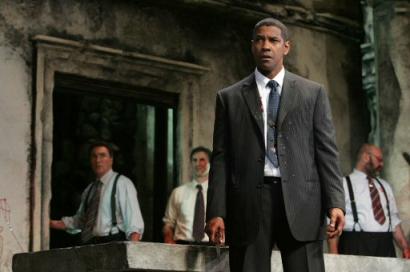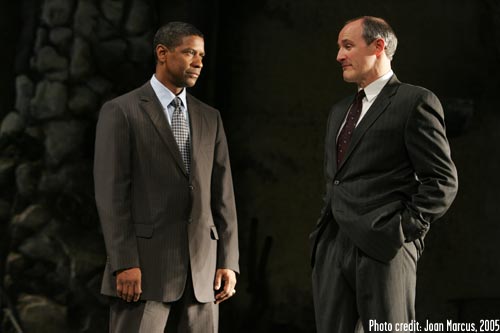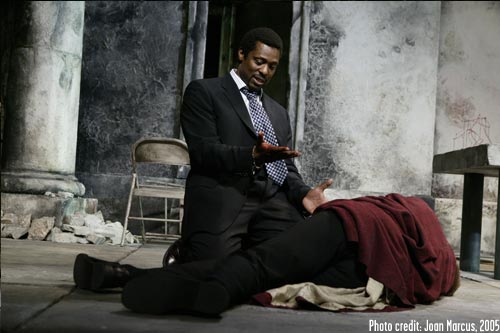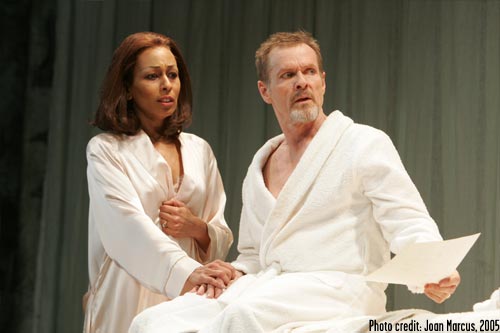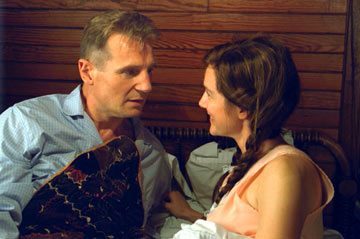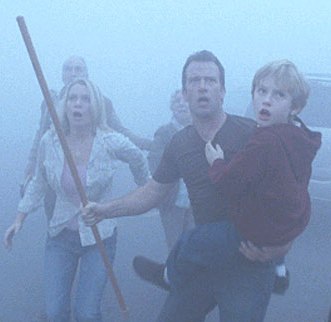 Going into the late-night showing of Frank Darabont’s version of Stephen King’s The Mist this evening, I was at best hoping for a good, scary B-movie — Prince of Darkness, The Thing — with perhaps a bit of choice sociopolitical grist (the Romero Deads, Invasion of the Body Snatchers, They Live) thrown in for good measure. (After all, the ominous poster and tagline of the film (“Fear changes everything”) pretty much announces there’ll be some post-9/11 commentary lurking amid the monsters.) Alas, The Mist fails on both fronts. Despite a good cast that do what they can with some woefully scripted material, the film is rarely very frightening — mostly because so many of the characters are so one-note that it’s hard to get all that concerned about their well-being. (The cheap FX don’t help.) Worse, Darabont’s attempts at allegory here come across as ponderous, ham-handed, and facile. The film aims to suggest that people in the grip of unyielding terror will do and fall for anything, which of course is a scary thought — one that not only resonates with our current political predicament, but permeates tons of horror movies from Night of the Living Dead to 28 Weeks Later. But, in its shrill, one-note portraits of religion and of “average” people (re: Red Staters), The Mist feels as elitist, hyperbolic, and echo chamber-y as a bad dKos talkback.
Going into the late-night showing of Frank Darabont’s version of Stephen King’s The Mist this evening, I was at best hoping for a good, scary B-movie — Prince of Darkness, The Thing — with perhaps a bit of choice sociopolitical grist (the Romero Deads, Invasion of the Body Snatchers, They Live) thrown in for good measure. (After all, the ominous poster and tagline of the film (“Fear changes everything”) pretty much announces there’ll be some post-9/11 commentary lurking amid the monsters.) Alas, The Mist fails on both fronts. Despite a good cast that do what they can with some woefully scripted material, the film is rarely very frightening — mostly because so many of the characters are so one-note that it’s hard to get all that concerned about their well-being. (The cheap FX don’t help.) Worse, Darabont’s attempts at allegory here come across as ponderous, ham-handed, and facile. The film aims to suggest that people in the grip of unyielding terror will do and fall for anything, which of course is a scary thought — one that not only resonates with our current political predicament, but permeates tons of horror movies from Night of the Living Dead to 28 Weeks Later. But, in its shrill, one-note portraits of religion and of “average” people (re: Red Staters), The Mist feels as elitist, hyperbolic, and echo chamber-y as a bad dKos talkback.
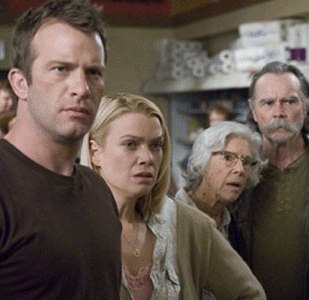 Set somewhere in Maine, as per King’s usual m.o., The Mist opens with several nods to what Darabont (probably correctly) assumed would be his core audience: the fanboy nation. For it turns out our protagonist David Drayton (Thomas Jane) is a movie poster artist a la Drew Struzan, and the first moments of the film feature him working in his studio on what’s obviously a poster of Roland the Gunslinger of Stephen King’s The Dark Tower. (The one-sheet from John Carpenter’s The Thing is also featured on the wall, and Drayton makes a quip early on about the standard two-face movie poster, pitched right at the AICN crowd.)
Set somewhere in Maine, as per King’s usual m.o., The Mist opens with several nods to what Darabont (probably correctly) assumed would be his core audience: the fanboy nation. For it turns out our protagonist David Drayton (Thomas Jane) is a movie poster artist a la Drew Struzan, and the first moments of the film feature him working in his studio on what’s obviously a poster of Roland the Gunslinger of Stephen King’s The Dark Tower. (The one-sheet from John Carpenter’s The Thing is also featured on the wall, and Drayton makes a quip early on about the standard two-face movie poster, pitched right at the AICN crowd.)
At any rate, after a particularly virulent storm, David, his son (the obligatory cute kid of the story), and his next-door neighbor, a hotshot lawyer from New York (Andre Braugher), all venture into town to get supplies. But, unfortunately for them, strange things are afoot at the Circle K: Very soon, an unnatural, unholy fog rolls in, and it becomes clear relatively quickly that staying exposed to it will get you killed in horrific fashion by large tentacles, winged insects, or other unspeakable Lovecraftian creatures from out of nowhere. And so the people at the supermarket hunker down for a long haul, but divisions quickly emerge among the ranks of the terrified. In the manner of horror films, Braugher’s lawyer character won’t believe anything that’s going on, and he and other denizens (Bill Sadler’s working-class stiff, for example) begin to take umbrage at imagined slights. Even more problematically, we have a true believer in our midst, the Bible-thumping spinster Mrs. Carmody (Marcia Gay Harden), and as the terror mounts and the Rapture looks nigh, she begins to relish her assigned role as Old Testament prophet, right down to the human sacrifices…
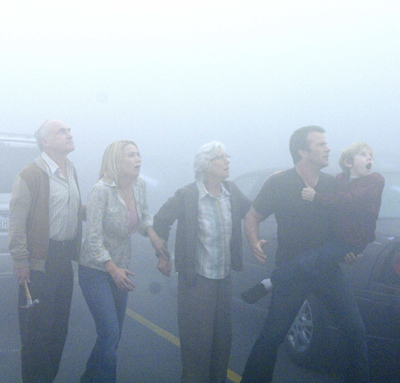 It’s been over fifteen years since my big King phase, so I barely remember the novella at all. (Of the Skeleton Crew stories, the ones that made the most impression on me were “The Jaunt” and “Survivor Type.”) But I presume some –probably even most — of the blame resides with King for Mrs. Carmody. (The End of Days psycho-Christian definitely seems in his wheelhouse.) Nevertheless, as written here, she’s way too over the top to be taken seriously, especially after Darabont starts layering on the post-9/11 stuff like a paste. (There’s a meeting held among the saner folk where they break down her appeal for the scared, in case you somehow missed the allegory thus far.) Worse, most of the people in the supermarket who fall under her spell — exemplified by Sadler’s malleable redneck — are so cardboard cut-out they might as well be carrying torches and pitchforks from the opening reel. You’d think given a apocalyptic situation like the one faced in The Mist that faith and religion might pop up in many forms. But there’s no nuance or depth at all to Darabont’s presentation, just evil religionists and their dupe followers.
It’s been over fifteen years since my big King phase, so I barely remember the novella at all. (Of the Skeleton Crew stories, the ones that made the most impression on me were “The Jaunt” and “Survivor Type.”) But I presume some –probably even most — of the blame resides with King for Mrs. Carmody. (The End of Days psycho-Christian definitely seems in his wheelhouse.) Nevertheless, as written here, she’s way too over the top to be taken seriously, especially after Darabont starts layering on the post-9/11 stuff like a paste. (There’s a meeting held among the saner folk where they break down her appeal for the scared, in case you somehow missed the allegory thus far.) Worse, most of the people in the supermarket who fall under her spell — exemplified by Sadler’s malleable redneck — are so cardboard cut-out they might as well be carrying torches and pitchforks from the opening reel. You’d think given a apocalyptic situation like the one faced in The Mist that faith and religion might pop up in many forms. But there’s no nuance or depth at all to Darabont’s presentation, just evil religionists and their dupe followers.
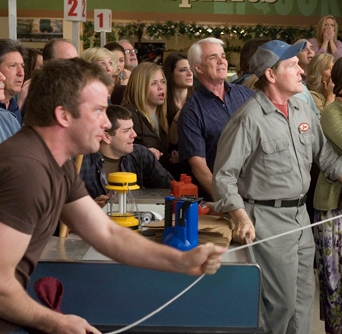 Then again, to be fair, none of the other characters are multi-dimensional either, and so I found myself rooting for actors instead. Thomas Jane is always a likable presence (he and Serenity‘s Nathan Fillion seem to be fighting it out for the mantle of the new Michael Biehn), and he’s solid enough here. Toby Jones (of the “other” Capote movie) is also stuck with a flat role — he’s Dignity Under Pressure — but makes an impression regardless. And it’s good to see Frances Sternhagen (a.k.a. the doctor from Outland) flitting about as a senior citizen not unwilling to smite false prophets with cans of peas. But, try as they might, they can’t raise the stakes here.
Then again, to be fair, none of the other characters are multi-dimensional either, and so I found myself rooting for actors instead. Thomas Jane is always a likable presence (he and Serenity‘s Nathan Fillion seem to be fighting it out for the mantle of the new Michael Biehn), and he’s solid enough here. Toby Jones (of the “other” Capote movie) is also stuck with a flat role — he’s Dignity Under Pressure — but makes an impression regardless. And it’s good to see Frances Sternhagen (a.k.a. the doctor from Outland) flitting about as a senior citizen not unwilling to smite false prophets with cans of peas. But, try as they might, they can’t raise the stakes here.
I’ll admit to liking a few brief flourishes in The Mist. At one point, a low-budget CGI tentacle hungrily crushes a bag of dog food, which is exactly the type of horrific-meets-the-mundane moment that King writes so well. Late in the game, the survivors of the tale to that point witness a truly Cthuhulian nightmare, all hooves and tentacles, one that’s nearly impossible to comprehend. And then there’s the ending…which I expect will be remembered for much longer than the rest of the film. I won’t give it away here, but I will say that, while admirable in its own way, it also felt like a Twilight Zone gimmick that came out of nowhere, felt unearned, and didn’t really hold up with the story to that point. (I can see an argument that ties it in to the rest of the film, but it’s a stretch.) Ultimately, The Mist isn’t as godawful as, say, Dreamcatcher, but it is yet another drab and mediocre King adaptation in a world full of them. If I were you, I’d wait for The Mist to clear.

